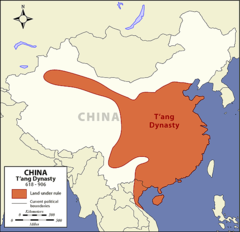AP World History Strayer Chapter 8 Vocabulary Flashcards
Terms : Hide Images [1]
| 8056278099 | Sui Dynasty | *Definition:* Short dynasty between Han and Tang. *Significance:* Built Grand Canal, strengthened government, and introduced Buddhism to China. |  | 0 |
| 8056278100 | Tang Dynasty | *Definition:* Dynasty often referred to as "China's Golden Age". (618 CE - 907 CE) *Significance:* China expands to Vietnam, Imperial examination perfected. New technologies (paper money, gunpowder, junks, etc...) through silk road. |  | 1 |
| 8056278101 | Song Dynasty | *Definition:* (960 CE - 1279 CE) Started by Tai Zu. *Significance:* Million people there. Foot binding, magnetic compass, navy, and traded with India and Persia. |  | 2 |
| 8056278102 | Hangzhou | *Definition:* Capital of later Song Dynasty. *Significance:* Permitted overseas trading with population exceeding 1 million. |  | 3 |
| 8056278103 | Economic Revolution | *Definition:* Rapid population growth, economic speculation, increase in industrial production and innovations (Song dynasty). *Significance:* Made China "by far the richest, most skilled, and most populous country on Earth." |  | 4 |
| 8056278104 | Foot Binding | *Definition:* Practice in Chinese society to mutilate women's feet to make them smaller. *Significance:* It was associated with images of female beauty and eroticism. |  | 5 |
| 8056278105 | Tribute System | *Definition:* Chinese method of dealing with foreign lands and people that assumed subordination of all non-chinese authorities. They required all foreigners wanting access to China to pay tribute. *Significance:* System the attempted to regulate their relationships with Northern Nomads. |  | 6 |
| 8056278106 | Xiongnu | *Definition:* Major nomadic confederation that was established in 200 BCE and eventually reached from Manchuria to Central Asia. *Significance:* Persuaded a Chinese emperor to negotiate an arrangement that recognized the nomadic state as political equal. |  | 7 |
| 8056278107 | Khitan/Jurchen People | *Definition:* Nomadic people who established a state that included parts of Northern China. *Significance:* Was a nomadic group who "picked up the pieces" after collapse of Tang Dynasty. |  | 8 |
| 8056278108 | Silla Dynasty (Korea) | *Definition:* First ruling dynasty to bring a measure of political unity to Korean Peninsula. *Significance:* Allied with China to bring political unity to the peninsula for the first time. |  | 9 |
| 8056278109 | Hangul | *Definition:* Phonetic alphabet in Korea (14th century). *Significance:* Helped Korea move toward greater cultural independence. |  | 10 |
| 8056278110 | Shotoku Taishi | *Definition:* Japanese statesman who launched the drive to make Japan into centralized bureaucratic state modeled on China. *Significance:* Launched a series of large-scale missions to China. |  | 11 |
| 8056278111 | Bushido | *Definition:* "Way of the Warrior". *Significance:* A distinct set of values for Samurais. |  | 12 |
| 8056278112 | Izumi Shikibu | *Definition:* Mid Heian period Japanese poet. *Significance:* She wrote about political posturing and love affairs of aristocratic men and women. |  | 13 |
| 8056278113 | Chinese Buddhism | *Definition:* Entered China through cultural accommodations. *Significance:* Useful to helping nomadic rulers govern northern China because it was foreign. |  | 14 |
| 8056278114 | Emperor Wendi | *Definition:* Sui Emperor who patronized Buddhism. *Significance:* He was responsible for the monasteries constructed at the base of China's 5 sacred mountains. |  | 15 |
